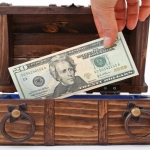Home > Investment Guide > Financial Guide
Six Ways A Bad Credit Score Can Affect You
You may find getting a car loan, credit card, or mortgage difficult if your credit score could be better. Still, if your credit card or loan gets accepted, the interest rates on these loans will be higher. Since employers and landlords want to engage with people who have a track record of responsible money management, the consequences of bad credit can even impact your search for a job or an apartment.
You might need help with applying for bad credit online loans. Therefore, this article covers what a bad credit score is and six ways a bad credit score can affect you. So let's get started.
What Is a Bad Credit Score?
Consider your credit score as a grade for the way you manage your money. Even though there are other credit-scoring models, the FICO score is widely popular among lenders. Usually, this three-digit number ranges between 300 and 850, and the range between 300 and 579 is called a bad FICO score. Let's break down credit scores briefly in a table.
Credit Score Breakdown
|
Credit Category |
Score Range |
|
Excellent |
800-850 |
|
Very good |
740-799 |
|
Good |
670-739 |
|
Fair |
580-669 |
|
Bad |
300-579 |
6 Ways a Bad Credit Score Can Affect You
You probably made financial mistakes along the way if you have a bad credit score. Employers and landlords may consider you less reliable if your credit score is low, which lenders may interpret as a sign that you might be a high-risk borrower. These beliefs have significant drawbacks and can influence almost every aspect of your life. Here are six ways that having bad credit can harm you.
1. Higher Interest Rates
A low credit score is a warning sign to lenders that you may not be able to complete your payments on time and in full. Early on, lenders will charge you higher interest rates to make up for anticipated losses to reduce the risk that you might default on your loan. Additionally, they are less likely to offer you promotional rates and discounts, so taking loans will cost you more in the long run than your peers with better credit scores.
2. Housing
If your credit score is less than 620, renting a place could be difficult because many landlords and property management organizations consider 620 the minimum starting point for tenants. Expect to pay much higher interest rates if you want to buy a new house but have poor credit.
Even with poor credit, you may be able to rent an apartment, but it could take a lot more effort to prove your case, including paying a larger security deposit or even getting a cosigner. Additionally, you may need to provide a significant 20% or higher down payment. If you're a first-time home buyer, you do have some alternatives to conventional lenders, such as government-backed VA and USDA loans, which don't have specific credit score requirements.
3. Credit Cards
There are credit cards designed for people who have poor credit, but a lot of them require a security deposit. You may only qualify for the best cards on the market if your credit score is high, and you'll have to charge higher interest rates on your balance each month.
Too many credit cards that are maxed out can negatively impact your score. Completing a card can also affect you because it will shorten your credit history and increase your credit utilization rate. Additionally, you're less likely to obtain promotional rates, discounts, or other benefits related to your credit products.
4. Auto Loans
Suppose your application for a bad credit auto loan is approved. In that case, you may expect to pay a down payment, need a cosigner, and have provided a certain amount of income documentation. You might also expect higher monthly payments because of higher interest rates. However, You can request to refinance your auto loan at a much better rate after you can boost your credit score.
5. Employment
A potential employer may request to see your credit report as part of a complete background check. A poor credit score could prevent you from obtaining the job since some employers associate it with a lack of reliability or trustworthiness, especially if your job involves handling money. Candidates with a poor financial history could be more likely to engage in fraud, theft, or poor handling of sensitive company information.
6. Security Deposits
Lenders and landlords may doubt your ability to make regular payments if you have poor credit. To protect against financial losses, organizations could require larger security deposits before allowing you to move in or use their service.
Conclusion
To sum up, it's essential to understand how a bad credit score affects your financial life and to be proactive in raising your score. From improving budgeting skills, paying bills on time, and avoiding unnecessary credit inquiries, there are many strategies you can use to start increasing your credit score today.
More to Read:
Previous Posts:




